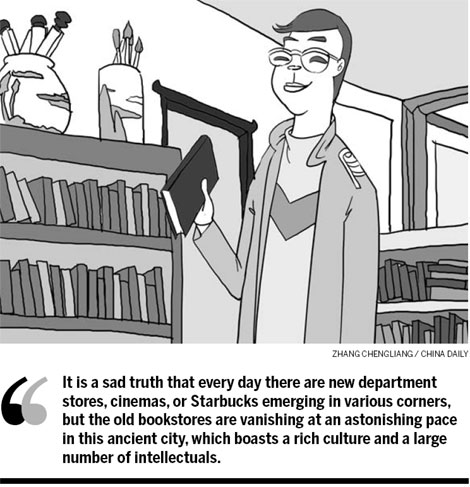Comment
Vanishing bookstores speak volumes
By Qin Zhongwei (China Daily)
Updated: 2010-03-16 10:42
 |
Large Medium Small |

I am not a bookworm, but I like going to bookstores more than anywhere else.
A two-floor bookstore in Wudaokou was once on my list of favorite bookstores because of its warm colors, quiet music, polite and knowledgeable staff, and the comfy chairs that welcome customers to browse books from its opening to closing without interruption.
I had not been to the bookstore in months but visited it last weekend in search of a book recommended by a friend. To my surprise, its first floor now basically does not sell books. Instead, its clearly laid-out shelves are replaced by souvenirs, toys, postcards and office supplies such as notepads, bookmarks and so on.
In the end, I was disappointed that I could not find the book, but even more dismaying is that the bookstore is shrinking and is no longer the store that I enjoyed visiting as a college student.

Bookstores might not be so profitable nowadays, when people read online and download books onto portable readers. So I understand that the various knickknacks proffered on the first floor might be a strategy the shop's owners adopted to cope with a worsening market. But can they successfully maintain customer flow this way or will they lose loyal customers who come in search of books they want to read?
Disanji, the largest private bookstore in Beijing, ended its chapter in January after losing almost 50 million yuan during its three years in business. It was not the first to admit failure. Surely it will be not the last one, either. Beijing Business Today reported that more than half of the country's private bookstores closed in the past 10 years, and the percentage will continue to grow.
Some bookstores, including the State-owned bookshop in Xidan, perhaps the largest in Beijing, appear to be prosperous. But I don't really like the Xidan store. It looks like a huge and crowded supermarket with flocks of people coming in and out every day. The only difference is the content on its shelves are books rather than snacks.
Based on my limited observation, good bookstores are not defined by their size. The good bookstores are just like the famous English-language bookstore Shakespeare & Co located in Paris' Left Bank. It not only sells books to readers, but also affects people spiritually with its decoration, its selection, its history and the customers' memories associated with the bookstore itself.
That type of bookstore now only exists in old Beijingers' memories.
Fortunately, last weekend I finally I found the book I wanted in another bookstore near the National Gallery.
It was a traditional bookshop with a long history. People there come in and out quietly. They either read near the bookshelves, or pick out a novel and read it on the stairway. A big window makes the shop well-lighted and customers don't make noise, other than turning the pages softly. This warm picture must rekindle memories for the old bookworms.
It is a sad truth that every day there are new department stores, cinemas, or Starbucks emerging in various corners, but the old bookstores are vanishing at an astonishing pace in this ancient city, which boasts a rich culture and a large number of intellectuals. Smart businessmen are reluctant to open new ones, certain that they would lose the battle over online reading and purchasing habits.
If bookstores can be called lighthouses, in this city, their lights are gradually dimming. I hope that one day our children will still know where to find these lighthouses.
| 分享按钮 |